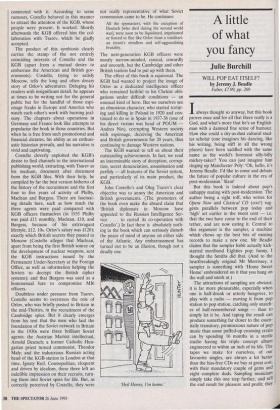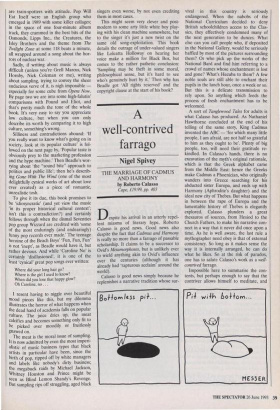A little of what you fancy
Julie Burchill
WILL POP EAT ITSELF? by Jeremy J. Beadle Faber, f7.99, pp. 269 Ialways thought so anyway, but this book proves once and for all that there really is a God, and what's more that he's an English- man with a damned fine sense of humour. How else could a dry-as-dust cultural stud- ies scholar (one imagines his dancing, like his writing, being stiff in all the wrong places) have been saddled with the same name as the world's foremost silly-billy mickey-taker? You can just imagine him ringing up Manchester Poly: 'Oh, hello, it's Jeremy Beadle. I'd like to come and debate the future of popular culture in the era of post-modernism.' Slam!
But this book is indeed about pop's unhappy mating with post-modernism. The author being a right toff, who writes for Opera Now and Classical CD (coo!) sug- gests parallels between pop today and 'high' art earlier in the twent cent — i.e. that the two have come to the end of their tether, and are now eating it. Central to this argument is the sampler, a machine which chews up the best bits of existing records to make a new one. Mr Beadle claims that the sampler habit actually kick- started moribund Eighties pop; funny, I thought the Smiths did that. (And to the heartbreakingly original Mr Morrissey, a sampler is something with 'Home Sweet Home' embroidered on it that you hang on the wall and smirk at.) The attractions of sampling are obvious; it is far more pleasurable, especially when one is half-drunk or utterly hungover, to play with a radio — moving it from pop station to pop station, catching only snatch- es of half-remembered songs — than to simply let it be. And taping the result can produce something far closer to the essen- tially transitory, promiscuous nature of pop music than some puffed-up crooning cretin can by spending 16 months in a sterile studio having his triple concept album engineered to within an inch of its life. The tapes we make for ourselves, of our favourite singles, are always a lot better than the hiss-free CDs we buy at great cost, with their mandatory couple of gems and eight complete duds. Sampling musicians simply take this one step further, and sell the end result for pleasure and profit; they are train-spotters with attitude. Pop Will Eat Itself were an English group who emerged in 1989 with some killer collages; in the space of one four-minute album track, they crammed in the best bits of the Osmonds, Lipps Inc., the Creatures, the Isley Brothers and the theme from The Twilight Zone at some 118 beats a minute, all wrapped around a song about the hor- rors of nuclear war.
Sadly, if writing about music is always difficult (unless you're Grell Marcus, Nick Hornby, Nick Coleman or me), writing about sampling, trying to convey the sheer audacious verve of it, is nigh impossible especially for some cube from Opera Now. By page two we are into some high-falutin' comparisons with Pound and Eliot, and that's pretty much the tone of the whole book. It's very easy to say you appreciate low culture, but when you can only describe its worth by comparing it to high culture, something's wrong.
Silliness and contradictions abound: 'If you really want to know what's going on in society, look at its popular culture' is fol- lowed on the next page by, 'Popular taste is obviously prey to the marketing profession and the hype machine.' Then Beadle's wor- rying about 'the "sound bite" approach to politics and public life'; then he's describ- ing Gone With The Wind (one of the most delightfully cynical works of art about love ever created) as a piece of romantic, unrealistic tosh.
To give it its due, this book promises to be 'idiosyncratic' (and yet view the music 'In its proper historical cultural context'; isn't this a contradiction?) and certainly follows through when the dismal Seventies Pop group Wizzard are credited with 'some of the most enduringly (and endearingly) funny pop records ever made.' The teenage heroine of the Beach Boys"Fun, Fun, Fun' is not 'inept', as Beadle would have it, but rather devious. And while 'Caroline No' is certainly 'disillusioned', it is one of the least 'cynical' great pop songs ever written:
Where did your long hair go?
Where is the girl I used to know? When did you lose that happy glow? Oh Caroline, no ...
I resent having to niggle over beautiful mood pieces like this, but my dilemma illustrates the horror of what happens when the dead hand of academia falls on popular culture. The juice dries up, the meat calcifies and becomes something only fit to be picked over moodily or fruitlessly gnawed on.
The meat is the moral issue of sampling. It is now admitted by even the most imperi- alistic of music business types that black artists in particular have been, since the birth of pop, ripped off by white managers and labels like nobody's dirty business; the megabuck raids by Michael Jackson, Whitney Houston and Prince might be seen as Blind Lemon Shandy's Revenge. But sampling rips off struggling, aged black singers even worse, by not even crediting them in most cases.
This might seem very clever and post- modern to some arty little white boy play- ing with his clean machine somewhere, but to the singer it's just a new twist on the same old song-exploitation. This book details the outrage of under-valued singers like Loleatta Holloway on hearing her voice make a million for Black Box, but comes to the rather pathetic conclusion: `Sampling may be theft in some moral, philosophical sense, but it's hard to see who's genuinely hurt by it.' Then why has Beadle got 'All rights reserved' and the copyright clause at the start of his book?



























































 Previous page
Previous page